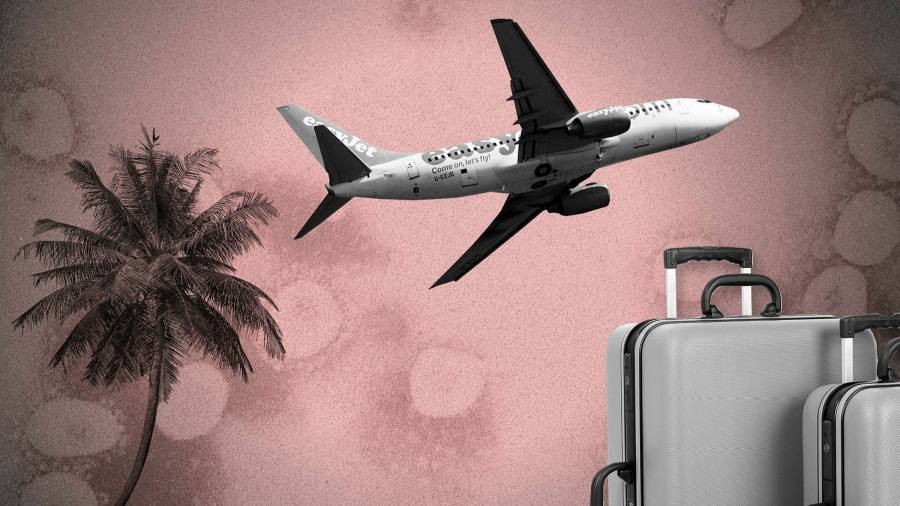[ad_1]
Passengers arriving in the UK face strict new quarantine restrictions and ministers have urged people to hold off booking summer holidays as the government focuses on cutting international travel to the absolute minimum.
The tougher approach to travel — taken a year into the coronavirus crisis — has drawn criticism from some senior Conservatives and dismay from the travel industry, which is facing a second summer of disruption.
What are the new rules?
From Monday, British residents returning to England from 33 countries on a government “red list†of places identified as high risk sources of more virulent variants of coronavirus will have to submit to a 10-days supervised hotel quarantine system on arrival. Non-residents are not permitted to enter the UK from those countries.
For the first time since the start of the pandemic, all travellers arriving in England, regardless of point of departure, will have to take two coronavirus tests — on days two and eight after arrival — as well as the existing requirement for a pre-departure test. Those arriving from non-red list countries are, as previously, required to self-isolate at home.
At the same time there will be tough new fines for people who breach the new rules, with ministers threatening jail sentences of up to 10 years for those who fail to disclose that they have recently been in one of the red list countries.
To confuse matters further, as health is a devolved issue, Scotland has decided to apply the rules more strictly. It has announced that anyone arriving from outside the UK’s common travel area with Ireland — not just those coming from the 33 nations on the so-called “red list†— will have to submit to 10-day hotel quarantine.
How will the new rules work and will they be enforced?
British residents arriving from the high-risk countries will be bussed to government-specified hotels near airports where they will remain under security supervision for 10 days. Each person will have to book a room in advance through a government portal that will go online on Thursday at a cost of £1,750.
Direct flights from the high-risk countries are banned, which means that those returning home will have to travel via a third country. Airport executives are still waiting to hear how or whether they will have to segregate passengers from “red list†countries.
The 10-year jail term threat has already met with criticism from senior Conservative politicians. Dominic Grieve, the former attorney-general, said the length of the potential jail terms was “entirely disproportionate†and were unlikely to be imposed by the courts.
Who can travel at the moment?
Anyone in the UK is currently banned from leaving the country for a holiday. Only a limited number of people have permission to travel abroad and they have to fill in forms to show that they have a valid purpose for doing so.
Legitimate reasons for travel include medical emergencies and certain jobs that require travel, including hauliers, diplomats and people working in the oil and gas industry.
Boris Johnson, prime minister, said on Wednesday that the number of people entering the country had fallen from 250,000 a day to under 20,000 — of which 5,000 were involved in “bringing vital supplies into this countryâ€.
Should people book summer holidays?
Grant Shapps, the transport secretary, said on Wednesday it was too early to book a trip, either in the UK or abroad, given uncertainties about the trajectory of coronavirus and the speed of vaccination.
But many people already have. Europe’s largest tour operator Tui said this week it has received nearly half of the number of bookings for summer as it had at the same point last year.
In general, anyone who has booked with an airline or tour operator would have to apply for a refund once it becomes apparent they cannot travel or would be reimbursed if their flight was cancelled. Tui said on Wednesday anyone with a booking between March 8 and the end of May could change it without charge.
The concerted effort to stop people from even making plans to travel has dismayed the travel industry, which has been reeling from a year of disruption.
How does the UK approach compare with other countries?
The opposition Labour party has urged Johnson to match Scotland’s more draconian approach and accused him of being behind the curve. But the prime minister pointed out that no other European country has a hotel quarantine system. Indeed only a handful of other places have introduced hotel quarantine for all visitors, including New Zealand, Australia and Hong Kong, although those have been in place for almost a year.
Several other European countries, including France and Germany, have restricted travel from high-risk areas and require passengers to be tested before arrival and then self-isolate.
The border issue has been a regular point of contention within the UK cabinet for a year, reflecting a wider tension between public health and the economy.
Will the measures work?
Some scientists have been calling for tighter border controls since the outbreak of the pandemic. But even so Professor Graham Medley, a member of the government’s Scientific Advisory Group for Emergencies, said stricter measures would not be able to prevent transmission of new variants entirely. But they would reduce the speed of spread.
“You cannot stop it, you can only slow it down,†he said. “You don’t know where the variants are, you can’t be 100 per cent sureâ€, and there is the “added complication†that people can often travel to several locations before landing in the UK.
Countries on the UK’s ‘red list’
Angola, Argentina, Bolivia, Botswana, Brazil, Burundi, Cape Verde, Chile, Colombia, Democratic Republic of Congo, Ecuador, Eswatini, French Guiana, Guyana, Lesotho, Malawi, Mauritius, Mozambique, Namibia, Panama, Paraguay, Peru, Portugal, Rwanda, Seychelles, South Africa, Suriname, Tanzania, United Arab Emirates, Uruguay, Venezuela, Zambia, Zimbabwe
[ad_2]
Source link





